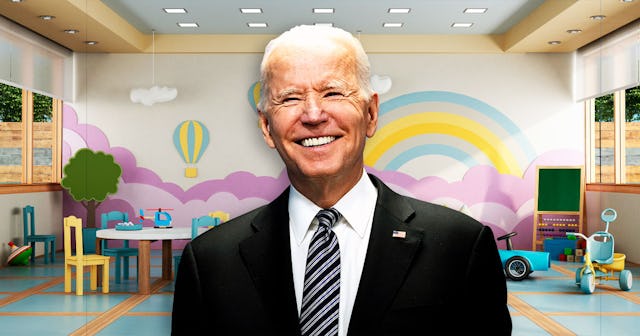President Biden Wants Universal PreK — Parents Do Too

If you have ever had a preschool-aged child and sent them to school, you have likely seen changes. Your child will learn skills not just academically, but in terms of behavior as well. They will work on letters and numbers; they’ll color and paint. Songs will be sung and dances will be danced. All of this while learning life skills like proper hand washing and waiting in line. Preschool can be a wonderful, enriching time for children. But in most cities across the country, reaping the benefits of preschool is a privilege due to cost restraints. President Biden aims to change that.
As part of this administration’s education plan, President Biden is aiming to provide free pre-K for all 3- and 4-year-old American children. As recently reported by the New York Times, the annual cost of this new program is upwards of $20 billion per year and will come from higher taxes paid by the wealthy. But will universal pre-K help our nation’s children? Some say yes, others are not so sure.
As reported by the Times, feelings about large-scale programs like the Federal Head Start program tend to be mixed. Head Start students were accomplished in math and reading in early elementary years, but as they got older, the skills did not remain as strong. This leaves people wondering whether universal pre-K is really worthwhile.
For more than 20 years, researchers have been gathering data from Boston’s public preschool lottery program. Starting in the late 1990s to the early 2000s, data was collected about children who won the lottery and were able to participate in the program and those who did not. Results are mixed, but generally, reviews are positive and reinforce the importance of a pre-K program.
According to the study, views on a high-quality early childhood education are positive. It is looked at as not only important, but a cost-effective way to handle early-life deficits in children. The study is the first of its kind to have randomized research to examine a large-scale program’s long-term effects on children.
The study looked at 4,000 applicants to Boston’s free preschool program from 1997 to 2003. The results compare student success for those who won the preschool lottery and those who did not. Data was collected from Boston Public Schools, The Massachusetts Department of Elementary and Secondary Education, as well as the National Student Clearinghouse. The study has three key findings.
nilimage/Getty
First, those students who attended Boston’s free public preschool were not only more likely to graduate from high school, but more apt to enroll in college. This preschool enrollment increased a student’s likelihood to graduate from high school by 6 percentage points. The impact for those attending college was similar. Those who attended preschool were 8 percentage points more likely to attend college after high school graduation. This was shown by increased enrollment at four-year Massachusetts colleges.
Secondly, there was little impact on elementary, middle and high school state standardized test scores for those attending public preschool. In addition, there does not seem to be a great effect on the likelihood of a student repeating a grade. Interestingly, those who attended Boston’s free public preschool showed less of a propensity for high school suspensions and decreased the likelihood of juvenile incarceration. While there was not a measurable impact on short-term test scores, the study suggests that ongoing skill formation lead to higher long-term educational attainment.
Finally, according to the study, there appears to be a greater positive effect on boys versus girls — but it does not seem to vary greatly for race or income levels. There have been questions as to whether universal preschool or a program targeted toward disadvantaged students should be offered. According to the results from Boston, both boys and girls who attend preschool have a higher chance of going to college. However, the effect is larger for boys. Findings also suggest that there is no difference in the impact of preschool by race or income. This was proxied by determining if a student received free or reduced-price lunch. The study concludes that all students, notwithstanding a slight gender difference, are likely to benefit from a universal pre-K program.
From what we can see, the impact of universal pre-K in Boston are positive. But how do we get the rest of our kids the same benefits? President Biden has exciting developments on the horizon. We are now four months into a new administration and we are seeing great things. Universal preschool is another step in the right direction for America. Our country needs to be developing future leaders at a young age. Giving our kids the opportunity to get the best out of their education as early as possible is the perfect place to start.
This article was originally published on